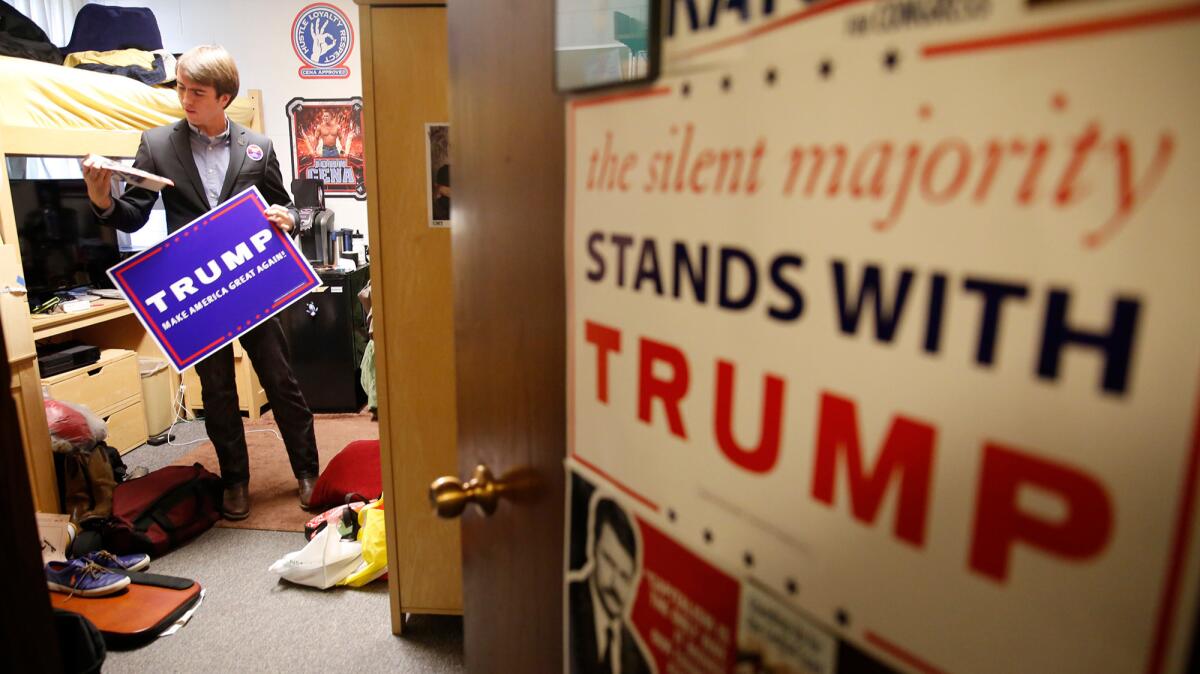Millennials are more conservative than Boomers or Gen Xers were at their age, study finds

- Share via
National polls suggest millennials will vote for Hillary Clinton over Donald Trump by large margins in November, but that doesn’t mean millennials lean further to the left than young people of previous generations.
On the contrary, according to a new study, a larger percentage of millennials identified as conservative during their last year of high school than did Baby Boomers and GenXers when they were the same age.
In 1976, when Baby Boomers were donning their caps and gowns, 21% of high school seniors identified themselves as conservative. In 2014, when it was the millennials’ turn to graduate, 29% did so, the study authors report.
Meanwhile, the percentage of high school seniors who identified as liberal was 35% in 1976 and 34% in 2014.
“In the 1980s, when the GenXers were young, it was considered the height of the young conservative — remember Alex P. Keaton on ‘Family Ties’?” said study leader Jean Twenge, a social psychologist at San Diego State University. “But among millennials, we see a higher percentage of those identifying as conservative than we did then. Considering the reputation of millennials as a very liberal generation, that is pretty surprising.”
The study, published this week in the Personality and Social Psychology Bulletin, found that generational groups have traditionally grown more conservative and Republican over time.
On average, Americans identify as more politically liberal at age 18 and become increasingly conservative between their 20s and 60s. If the millennial generation — defined as those born between 1980 and 1994 — continues that pattern, “they will not be the highly Democratic and liberal generation many had anticipated,” Twenge and her colleagues wrote.
“Right now, millennials look very liberal and more likely to vote for a Democrat, but maybe that’s just because they are young,” Twenge added in an interview.
John Della Volpe, director of polling at Harvard University’s Institute of Politics, said he has seen similar trends in his own work surveying the millennial generation over the past several years.
“My impression is that too many folks across America and even in the pundit class think of this generation as a monolith waving a socialist flag,” he said. “It is so far from the truth. It is much more nuanced than that.”
The new study is based on data from three large and long-running national surveys. That allowed the researchers to track generational differences in both political ideology and party identification over time.
The Monitoring the Future study polls a nationally representative sample of high school seniors. The American Freshman survey interviews a nationwide sample of first-year students at four-year colleges annually. Finally, the General Social Survey, conducted by NORC at the University of Chicago, queries a nationally representative sample of U.S. adults.
“The strength of these surveys is it allows us to look at generational trends without having to worry about what is due to age,” Twenge said.
The surveys show that millenials, in addition to being more conservative, are more politically polarized than Boomers or GenXers were at the same age, and that the rise in polarization has happened mostly on the right. More 12th-graders in the 2010s identified as strong Republican (22%) than in earlier decades, while the number of those identifying as strong Democrat (21%) has remained relatively flat. Only 23% expressed no preference for a political party in 2014, down from 29% in 1988.
Among college students, 50% of Boomers identified themselves as middle of the road, compared to 53% of GenXers and 47% of millennials.
One of the biggest surprises for Twenge was the huge jump in the percentage of people identifying as independent across generations. Among all adults, 46% identified as independent in 2014, she said. Among those between the ages of 18 and 29, it was even higher — 59%.
For context, from the early 1970s through the late 1990s, the percentage of all adults who considered themselves independent ranged from 41% to 39%.
Twenge, who wrote a book on millennials called “Generation Me,” said her previous research could help explain why so many of them identify as independent.
Among Americans of all ages, confidence in large institutions like government and corporations is at an all-time low, but that is especially true for young adults, she said.
“Millennials are very individualistic,” she said. “For them, joining a political party is kind of antithetical to the way they see the world. I think that explains a lot about what happened this election year.”
Della Volpe said this new paper and his own work at Harvard suggest that Republicans could do well with millennials, if they can figure out how to talk to them.
“The key finding in my last big survey in the spring of 2016 was that young people are indicating they are open to a more nuanced conversation about politics, and listening to views of Democrats as well as Republicans,” he said. “Why hasn’t the Republican Party in Washington and across the country figured this out and tried to take advantage of it?”
Do you love science? I do! Follow me @DeborahNetburn and “like” Los Angeles Times Science & Health on Facebook.
MORE IN SCIENCE
With a cesarean section, the path to obesity may begin at birth
NASA study of twins Mark and Scott Kelly examines biological limits of sending humans to Mars




